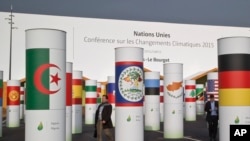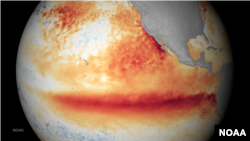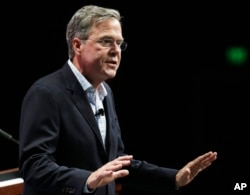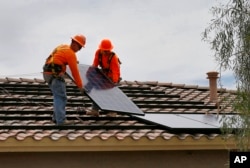As world leaders gather for a major climate conference in Paris, the U.S. delegation headed by President Barack Obama is pushing for strong, collaborative action based on the "overwhelming judgment of science," but the next administration led by his successor could have very different views on the issue.
Businessman Donald Trump leads the race for the Republican Party's nomination in the 2016 election and has said he does not believe in climate change or that it is a major problem for the United States.
"I consider it to be not a big problem at all," he said in September. "I think it's weather changes. It could be some man-made something, but you know, if you look at China, they're doing nothing about it. Other countries, they're doing nothing about it." He went further in a Twitter post this month, saying global warming was created to hurt the competitiveness of U.S. manufacturing and benefit China.
Texas Senator Ted Cruz, who has been rising in recent polls, has the field's strongest opposition to scientific claims that the planet has been getting warmer at a historical pace, as well as plans to change U.S. energy policy to try to help curb the impact. He said satellite data has recorded no warming for the past 17 years and that scientists were "actually adjusting the numbers." He asserted data was being used to control the economy and energy industry.
According to the U.S. National Oceanic and Atmospheric Administration, there is "overwhelming scientific evidence that Earth is warming and a preponderance of scientific evidence that human activities are the main cause." The agency says the planet is getting warmer at a faster rate than at any time in the past million years, with the global average surface temperature progressively rising in each of the past three decades.
Scientists have warned that letting global temperatures rise more than 2 degrees Celsius above pre-industrial levels will bring extreme weather and rising seas that would affect populations all over the world. Temperatures are already up almost one degree, mostly since 1976, according to NOAA.
Protect the economy first
Former Florida Governor Jeb Bush, former Arkansas Governor Mike Huckabee and Kentucky Senator Rand Paul all said the science was not settled when it came to climate change, with both Bush and Paul saying it was not clear how much is attributable to humans.
Bush said it would be "really arrogant" to say the science was decided, and that he would not want to "destroy the American economy" as a solution.
Florida Senator Marco Rubio, running third in recent polls, agreed with the idea that confronting climate change should not come at the price of harming the economy. He cited China as the top carbon producer and said he would not make it harder for U.S. companies to create jobs for the sake of policies that would do "nothing to change our climate," in reference to Obama administration plans.
In August, Obama announced a new plan to reduce carbon emissions by 32 percent below 2005 levels by 2030, and to boost the amount of power generated by renewable sources to 28 percent of overall power production.
Power companies already have been converting some of their operations in recent years, increasing their reliance on natural gas, solar and wind. As a result, government data has shown a drop in carbon emissions from coal-burning power plants. Reducing the amount of carbon released into the atmosphere is a major focus of global efforts to contain the rise in temperatures.
Former secretary of state Hillary Clinton, Vermont Senator Bernie Sanders and former Maryland governor Martin O'Malley — the three Democratic presidential candidates — all support Obama's plan.
Alternative energy and morality
New Jersey Governor Chris Christie said global warming "is real," but that he did not believe the issue required major government intervention. He has touted his state's use of alternative, cleaner energy sources that he said have grown because of his administration's efforts to make them "economically feasible."
Paul agreed on the need to involve solar, wind and hydropower, but that coal and natural gas should still be major parts of what he called an "all of the above policy." He said historically there have been times when the temperature went higher or lower and that at times the carbon in the atmosphere has been higher.
Neurosurgeon Ben Carson, who is second in the Republican polls, said there was "always going to be cooling or warming going on," something that he considered irrelevant. He said the obligation was to protect the environment.
For Sanders, climate change is "a moral issue."
"Nothing is going to happen unless we are prepared to deal with campaign finance reform, because the fossil fuel industry is funding the Republican Party, which denies the reality of climate change," he said in an October debate .He added that the U.S. needed to be aggressively working with China, India and Russia.
Clinton, too, cited the need to bring China and India together with the rest of the world. She said the Paris climate talks needed to bring a "verifiable commitment to fight climate change from every country gathered there."















